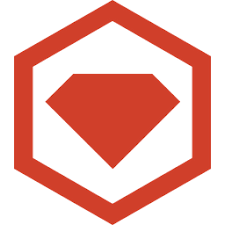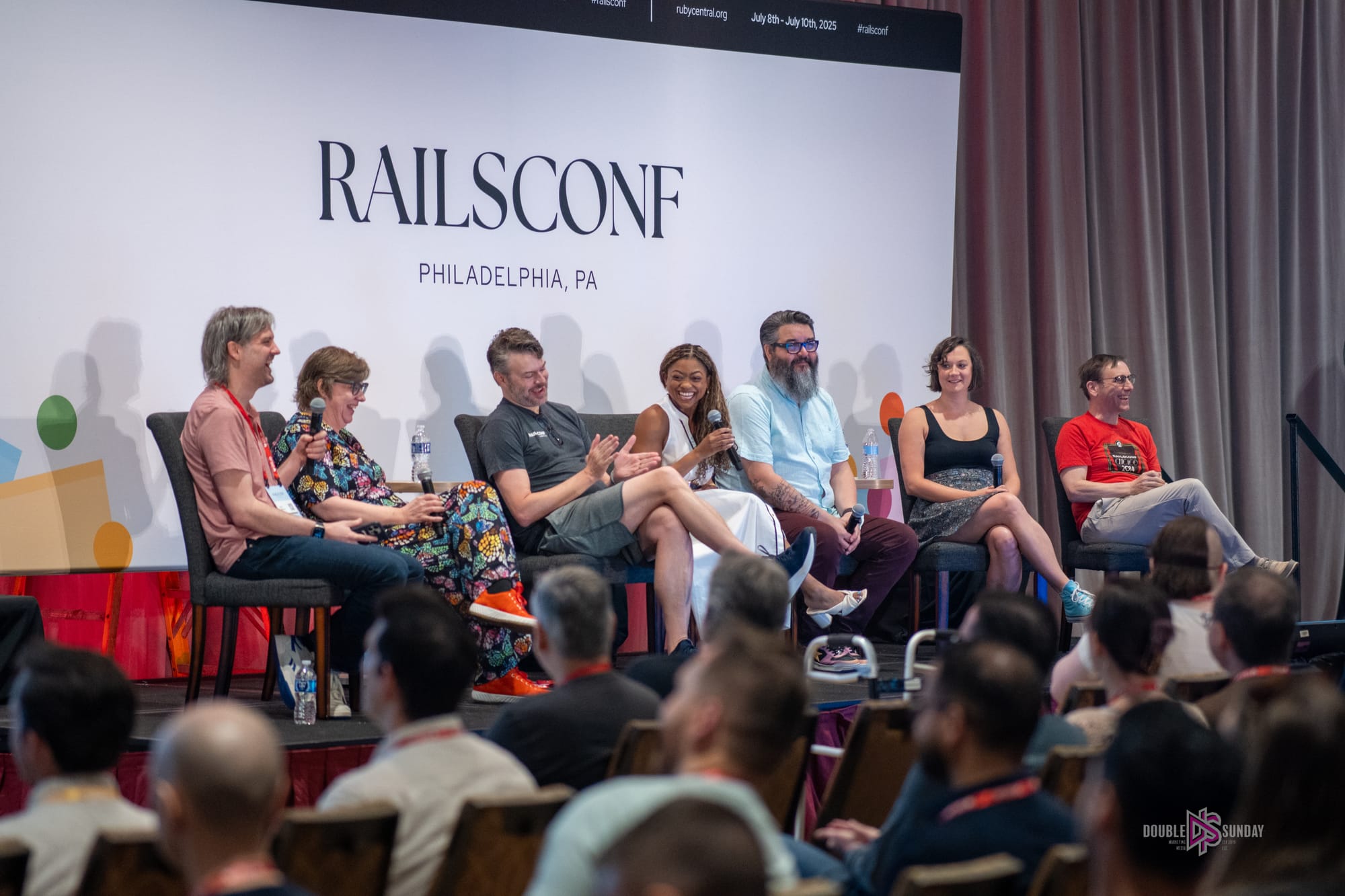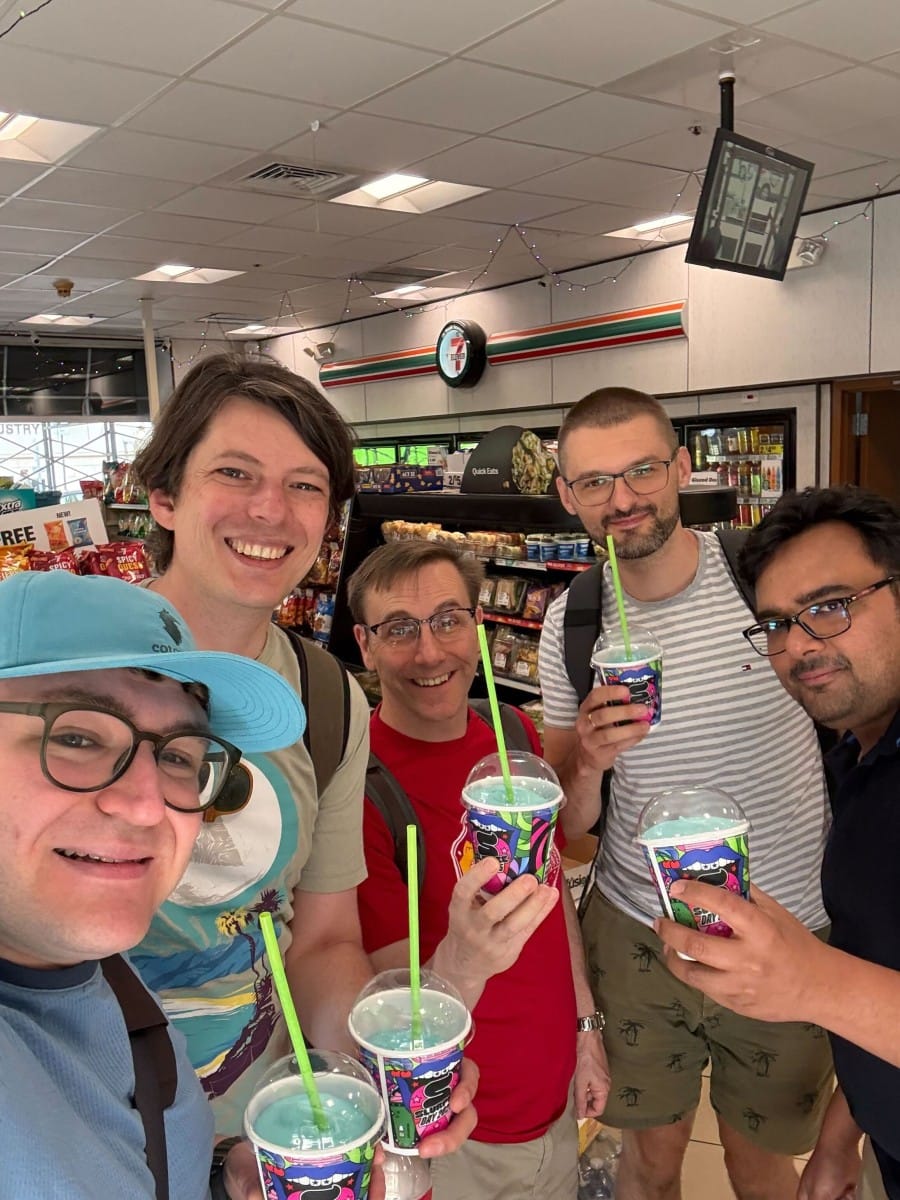
Ruby Central's OSS Changelog: August 2025
Hello, and welcome to the August newsletter. Read on for announcements about our Open Source Program and a report of the OSS work we’ve done over the past month!
As mentioned in our previous newsletters, we will now be sending out separate updates for the Open Source Program and general Ruby Central organization and community news.
You can expect our general Ruby Central newsletter (the Ruby Central README) in your inbox later this month.
Open Source Program Announcements
New ways to support RubyGems.org: A note from Marty
After giving my keynote at Baltic Ruby on sustainable open source, I was approached by several people who wanted to know about how the RubyGems service was funded. This led me to write a post going into detail about the funding model for RubyGems.org that I published on August 1st.
One suggestion that stood out during my hallway conversations was when an attendee asked if their company could provide RubyGems.org with money on the spot. I told him about our sponsorships, but it was too much effort, as it would involve other leaders in the company to get involved. If we gave him a way to make a small but meaningful payment by credit card, he could get it done. This led to the addition of supporter levels of $2,500 and $5,000 per year. Those levels were selected because they are within reason for a profitable software company or consultancy.
Given how many companies build with Ruby, it seemed like a great opportunity to build support for our operations. If this unlocks a new way for you or someone you know to get involved with supporting our work, take a moment to read more about it here (and share this news with your #RubyFriends!).
We'd also like to thank our first supporters for their generosity in giving back to RubyGems.org:
- CloudAMQP
- Pennylane
- GoBetween
- SerpAPI
- Coffee And Code
- +3 anonymous supporters
Not every supporter wishes to be recognized and may choose to remain anonymous.
If you'd like to appear in next month's Changelog and on our Supporter page, or simply give back to the OSS work you rely on, we would greatly appreciate your support!
The final RailsConf

Several of the RubyGems team members attended RailsConf 2025. This was the largest RailsConf since the pandemic, and it felt like a proper sendoff.
The team hosted a table during the hack space on community day. We had great conversations, five PRs submitted, and lots of folks eager to get involved! I heard about the various challenges and unusual edge cases that teams have, which helps us think about where we should invest our time and focus to have the most impact on the ecosystem.
Another highlight was watching Nick Quaranto, creator of GemCutter (the app that became RubyGems.org), join Samuel Giddins, our Security Engineer in Residence, to talk about the evolution of RubyGems.org. It brought back many memories of how we used to do things in Rails, with a fun section on remembering gems we no longer use.
We held a team offsite the day after the conference, where we had great discussions around refining our policies on gem deletion, archiving, gem ownership, and unreachable maintainers. We were largely in agreement, and copious notes were taken. We have a follow-up to draft these policies for internal review.
—Marty Haught, Director of Open Source

RubyGems News
In July, we shipped Bundler 2.7.0 and RubyGems 3.7.0, marking a major milestone in our roadmap toward Bundler 4. These releases introduce the new simulate_version setting, making it easier for developers to test breaking changes early and share feedback. We also continued work on long-requested improvements across RubyGems and Bundler, including experimental support for prebuilt binaries.
Bundler 2.7.0 and RubyGems 3.7.0 are out!
- This release marks a major milestone in the roadmap toward Bundler 4. With
bundle config simulate_version 4, users can now try out upcoming breaking changes in Bundler 4 ahead of time, helping gather feedback and ease the eventual transition. - Although the releases were mostly complete last month, we took additional time to carefully review and tag unreleased changes so our tooling could generate a clean and informative changelog. We also published a blog post summarizing the highlights of the release, and the release was mentioned in Ruby Weekly and Reddit.
- As part of the post-release cycle, we addressed some reported issues and community feedback:
Improvements in Bundler CLI documentation
- We noticed that some CLI commands and flags were not properly documented, making them harder for users to discover. Thanks to a contribution by @Edouard-Chin, we now have a CI check that ensures new commands and flags are reflected in the official documentation.
- The implementation introspects Thor commands and flags used by Bundler and verifies they are included in the man pages, making the CLI more consistent and discoverable.
Gems with Prebuilt Binaries
- After months of groundwork and iteration, experimental support for Python-style “wheels” has landed in RubyGems, thanks to @segiddins.
- This work introduces a new compatibility model for gems with native extensions, using
tag sets(inspired by Python) to represent which platforms a gem can run on. This solves long-standing limitations in the legacyGem::Platformsystem, which struggled to represent both "what can run" and "what's running now" in a backward-compatible format. - The feature is still under active development and review, and a formal RFC is coming soon. Support in Bundler will follow before this ships more broadly.
RubyGems.org News
This month, RubyGems.org continued to scale and improve its services with the support of our infrastructure donors: AWS, Fastly, and Datadog.
The following are highlights of what the team worked on this month:
RubyGems.org Organizations launches in private beta
- Organizations is one of the longest-standing feature requests for RubyGems.org. It allows teams and companies to better manage ownership and permissions across multiple gems under a shared namespace.
- We’ve launched the feature in private beta, and are currently collecting feedback from early users. We plan to open it up to more teams in the coming weeks. More information will be shared in an upcoming blog post.
Thank you
A huge thank you to all the contributors to RubyGems and RubyGems.org this month! We deeply appreciate your support and dedication.
Contributors to RubyGems:
- @deivid-rodriguez David Rodríguez
- @hsbt Hiroshi Shibata
- @simi Josef Šimánek
- @martinemde Martin Emde
- @nobu Nobuyoshi Nakada
- @segiddins Samuel Giddins
- @dgonzdev Dgonzdev
- @rye-stripe Peteris Rudzusiks
- @djbender Derek Bender
- @roberthopman Robert Hopman
- @indirect André Arko
- @hlascelles Harry Lascelles
- @Edouard-chin Edouard Chin
- @rhenium Kazuki Yamaguchi
- @duckinator Ellen Marie Dash
Contributors to RubyGems.org:
- @colby-swandale Colby Swandale
- @hsbt Hiroshi Shibata
- @mghaught Marty Haught
- @segiddins Samuel Giddins
- @simi Josef Šimánek
- @landongrindheim Landon Grindheim
- @a-mitch Alex Mitchell
- @qrush Nick Quaranto
- @spikex Spike Ilacqua
- @arunagw Arun Agrawal
- @jeffwidman Jeff Widman
- @mullermp Matt Muller
If we missed you, please let us know so we can include you in our shout out!
August 22, 2025